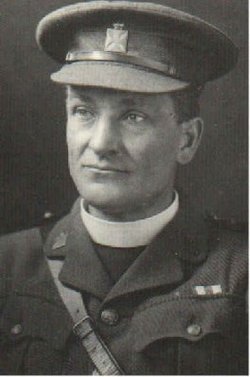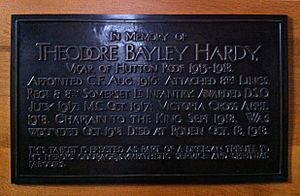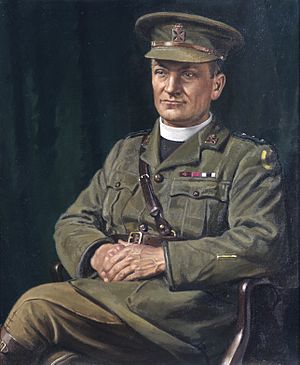Theodore Hardy facts for kids
Quick facts for kids
Theodore Bayley Hardy
|
|
|---|---|

Chaplain Theodore Hardy c.1918
|
|
| Born | 20 October 1863 Exeter, England |
| Died | 18 October 1918 (aged 54) Rouen, France |
| Allegiance | United Kingdom |
| Service/ |
British Army |
| Years of service | 1916–1918 |
| Rank | Chaplain to the Forces 4th Class |
| Unit | Army Chaplains' Department |
| Battles/wars | First World War |
| Awards | Victoria Cross Distinguished Service Order Military Cross Mentioned in Despatches |
Theodore Bayley Hardy (born October 20, 1863 – died October 18, 1918) was a brave British Army chaplain. A chaplain is like a minister or priest who serves in the military. He received the Victoria Cross (VC), which is the highest award for bravery in battle for British and Commonwealth soldiers.
Besides the Victoria Cross, Hardy also earned the Distinguished Service Order (DSO) and the Military Cross (MC). This made him one of the most decorated non-combatants of the First World War. A non-combatant is someone who helps soldiers but does not fight, like a chaplain or a medic.
Contents
Theodore Hardy's Early Life
Theodore Bayley Hardy was born in Exeter, England, on October 20, 1863. His parents were George and Sarah Richards Hardy.
He went to school at the Royal Commercial Travellers School in Pinner, and then the City of London School. Later, he studied at the University of London. In 1898, he became a priest.
From 1891 to 1907, Hardy worked as a teacher at Nottingham High School. One of his students was the famous writer D. H. Lawrence. Today, a house at the school is named after him. After that, from 1907 to 1913, he was the headmaster of Bentham Grammar School.
Theodore Hardy was married to Florence Elizabeth Hastings. They had a son and a daughter. Sadly, Mrs. Hardy passed away in 1914 after being ill.
Bravery in the First World War
When the First World War began, Theodore Hardy was 51 years old. He was a priest in a quiet village called Hutton Roof. He wanted to join the army right away, but he was told he was too old.
However, in August 1916, he was finally accepted. He became a Temporary Chaplain to the Forces, 4th Class. He joined the 8th Battalion of The Lincolnshire Regiment. During his time there, he performed many acts of bravery. These actions earned him several important awards.
Distinguished Service Order (DSO)
Hardy received the Distinguished Service Order on October 18, 1917. This award is given for great leadership and bravery.
One night, some soldiers were stuck in deep mud between the enemy lines and their own. Hardy volunteered to go with a rescue team. Even though he had a broken wrist and his arm was in splints, he helped bring almost all the men to safety. He then organized another team to rescue the last soldier. He stayed with them all night, even when they were under rifle fire. One person in his team was killed, but Hardy kept going. He even crawled very close to the enemy to help the wounded.
Military Cross (MC)
He was awarded the Military Cross on December 17, 1917. This medal is given for acts of bravery during battle.
Hardy showed amazing courage while helping wounded soldiers. He worked in areas that were constantly being shelled by the enemy. Many soldiers were getting hurt. He bravely helped find and carry the wounded. He also guided stretcher bearers to the aid post, making sure injured soldiers got the help they needed.
Victoria Cross (VC)
Finally, Theodore Hardy received the Victoria Cross on July 7, 1918. This is the highest award for bravery. Even though he was over 50, his courage and dedication to his soldiers were incredible. He earned the respect of everyone around him.
Here are some of the brave things he did:
- Helping a Wounded Officer: An army patrol went to attack an enemy post. Hardy heard the firing and followed them. He found an officer who was badly wounded about 400 yards beyond their front line. Hardy stayed with the officer until he could get help to bring him back. During this time, there was a lot of shooting. An enemy patrol even came between Hardy and his own lines.
- Rescuing Buried Men: Another time, an enemy shell exploded in the middle of one of their posts. Hardy immediately went to the spot, even though shells and trench mortars were still firing. He started digging out the buried soldiers. He managed to save one man who was completely buried. He then tried to dig out another, but sadly, that soldier had died. While he was digging, he was in great danger from the shelling and from the damaged building walls.
- Bringing in a Wounded Soldier: After a successful attack, the soldiers were forced to retreat. Hardy came out of the woods and asked for help to get a wounded man. He went back with a sergeant to where the soldier lay. This was very close to an enemy strong point. The wounded soldier was too weak to stand. But together, Hardy and the sergeant managed to get him back to their lines.
Throughout these battles, the enemy's artillery, machine guns, and trench mortars were constantly firing. Many soldiers were injured. But this very brave chaplain was seen moving calmly among the men, helping the wounded, and not thinking about his own safety at all.
On September 17, 1918, Hardy was given the special title of Chaplain to His Majesty.
Theodore Hardy's Death and Memorials

Theodore Hardy was wounded while trying to help more wounded soldiers. He died a week later in Rouen, France, on October 18, 1918. This was just two days before his 55th birthday.
He was buried at St. Sever Cemetery Extension in Rouen, France. There are memorials to him in several places. You can find memorials at Carlisle Cathedral, at the Harrow Arts Centre (which used to be his old school), at the City of London School, and in his old church at Hutton Roof.
His medals are kept and displayed at The Museum of Army Chaplaincy in Amport, Hampshire.


